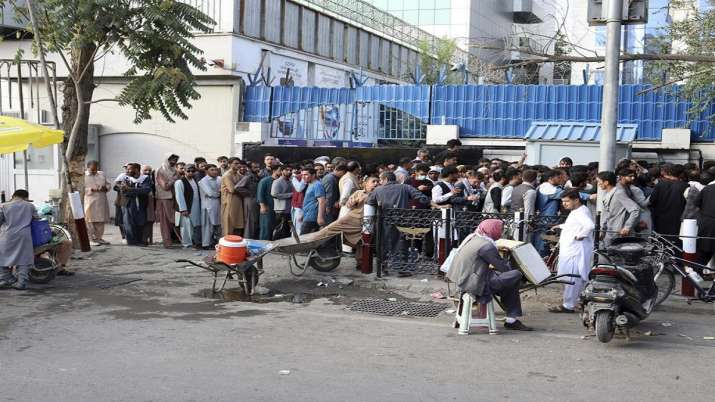
Afghans wait in long lines in front of a bank in Kabul to withdraw money.
According to multiple reports, Afghanistan’s already weak economy has declined since the Taliban’s takeover of Kabul last month. Soon after the Taliban’s siege of Kabul on 15 August, foreign aid was immediately halted.
In addition, the US withheld USD 9.4 billion in the country’s central bank reserves, The New York Post reported. In addition, the International Monetary Fund and the World Bank have also halted loans, and the Financial Action Task Force has warned its 39 member states to block. Taliban property
Hundreds of millions of people have been seen waiting in long lines to withdraw their savings since the Taliban takeover in August. The announcement by the US to freeze Afghanistan’s bank assets and freeze funds by international agencies has raised concerns among Afghans.
“With much of the international community refusing to recognize the Taliban regime, officially called the Islamic Emirate of Afghanistan, hard cash is hard to come by,” Holly McKay wrote in The Post. McKay said the currency is collapsing and the financial crisis is rapidly turning into a humanitarian catastrophe.
According to other experts, an informal economy may be the only way for Afghans, including the new government, to survive.
According to The Post, the Taliban themselves mainly relied on hawala to survive during their years of insurgency. Amid the deteriorating economic situation in the country, the United Nations has pledged more than USD 1 billion in aid for Afghanistan, warning that most of the population could soon fall below the poverty line.
Muhammad Suleiman bin Shah, deputy minister of commerce and industry in the previous Afghan government, said the country’s economy was fragile before the takeover. “Although a lot of (foreign) money was thrown at it, very little time or attention has been paid to the economy and economic development in the last 20 years,” Bin Shah said.
“The money was mostly spent on security and political issues. And right now, we are communicating anything with the rest of the world in terms of trade and finance. Whatever processes were initiated, even if they were at snail’s pace. Were moving forward, they have stopped now.”
(with inputs from ANI)
.